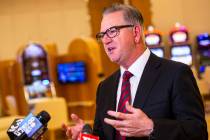FBI subpoenas in Whittemore probe aimed to surprise

The big splash FBI agents made Feb. 9 when they simultaneously served subpoenas across the state in their campaign contribution investigation of power broker Harvey Whittemore was designed to interview witnesses before they had a chance to get their stories straight.
“It’s a fairly obvious law enforcement technique,” said Peter Zeidenberg, a prominent Washington, D.C., defense attorney and former prosecutor with the Justice Department’s Public Integrity Section. “For obvious reasons, you want to talk to everybody before the target of the investigation gets wind of it.”
Kenneth Gross, another Washington defense lawyer experienced in dealing with campaign investigations involving conduit contributors, said agents were trying to catch those subpoenaed by surprise.
“Typically, the people who are used as conduits are not prosecuted,” Gross said. “A lot of times people will talk to the FBI in these initial interviews without seeking counsel first.”
Added Washington defense lawyer Douglas McNabb, who has battled the Justice Department for more than a quarter-century: “This kind of approach would certainly scare the hell out of the conduits. I think the FBI was hoping that at least one of them would say something that’s incriminating.”
About two dozen FBI agents served subpoenas Feb. 9 on Whittemore business associates and employees in some 30 locations in Northern and Southern Nevada.
FBI agents are investigating whether Whittemore funneled tens of thousands of dollars in illegal campaign contributions through his employees and family members to Nevada federal candidates as far back as 2007, sources have told the Las Vegas Review-Journal.
Allegations surfaced in the Whittemore investigation that employees of his former development company, Wingfield Nevada Group Holding Co., and its subsidiaries contributed to the campaigns and were reimbursed by Whittemore with company money the same day or the next day.
The FBI views conduit contributions as a way to skirt federal campaign finance laws that put ceilings on how much individuals can contribute to candidates.
Nevada U.S. Attorney Daniel Bogden declined to comment on the Whittemore investigation.
But he added, “I don’t believe we have previously charged anyone in the District of Nevada with such an offense.”
In recent years, Whittemore, an attorney and longtime influential lobbyist with many friends in Nevada’s political hierarchy, had turned his attention to land development.
In 2007, Whittemore, who considered U.S. Sen. Harry Reid, D-Nev., among his closest friends, was orchestrating the development of Coyote Springs, a master-planned community in Southern Nevada. With the help of Reid and other members of the Nevada congressional delegation, Whittemore sought to overcome several governmental hurdles because of county water issues and federal land issues.
But in 2008, the 43,000-acre development stalled because of the housing crash and economic recession.
The FBI’s carefully planned operation on Feb. 9 took into consideration that the subjects of the investigation were a close-knit group.
Zeidenberg — who helped prosecute and convict I. Lewis “Scooter” Libby, a top aide to former Vice President Dick Cheney, in the CIA leak investigation in Washington — said serving subpoenas simultaneously in cases like this catches accomplices with their guard down.
“They’re not thinking about what they’re going to say whenever they’re asked about the money,” he said.
One of the goals of the FBI’s strategy was to get the lower-level people in the scheme, the conduits, to cooperate.
“From investigators’ point of view, serving a number of subpoenas on the same day or around the same time has shock value that may induce cooperation in witnesses that can deliver a bigger target for investigators,” said Paul Padda, a former federal prosecutor who helped maintain the integrity of elections for the Nevada U.S. attorney’s office.
Christopher Blakesley, a University of Nevada, Las Vegas professor who specializes in criminal law, said most people would be “worried” about not cooperating with FBI agents if served with a subpoena under those conditions.
“My guess is that’s the reason why the FBI took that approach,” he said.
Padda and other legal experts said there is a strong chance that some people decided on the spot to cooperate with FBI agents.
The subpoenas seek documents related to campaign contributions they made and copies of checks to and from the politically connected lobbyist.
The requested records date to January 2007, and those subpoenaed have been instructed to bring them to a federal grand jury convening Feb. 29 in Reno.
Contributions made on one date — March 31, 2007 — to Reid’s re-election campaign have attracted the interest of FBI agents, sources have said.
On that day, the Senate majority leader’s campaign received at least $133,400 from 29 Whittemore associates, including his family members and his employees and their spouses, most of whom each contributed the maximum allowed $4,600, according to federal campaign reports.
The number has ballooned from the original $115,000 figure the Review-Journal reported, as more associates and family members have been identified in the campaign reports.
Harvey Whittemore and his wife, Annette, also contributed $9,200 on March 31, 2007, bringing the total monies bundled by Whittemore to at least $142,600. Their contributions, however, are not likely to be considered conduit contributions.
Gross, former head of enforcement for the Federal Elections Commission in Washington, said he has never seen that amount of money bundled all at once in a federal race. “I can’t recall another situation where that much came in on a (single) day,” he said.
In June 2008, a federal jury acquitted Michigan attorney Geoffrey Fieger and his law partner, Ven Johnson, of making more than $113,000 in conduit contributions through employees and relatives of the employees to the 2004 Democratic presidential campaign of John Edwards.
Those contributions were spread out over a period of time. Fieger, a former Michigan gubernatorial candidate, was known for representing the late advocate of assisted suicide, Jack Kevorkian.
Prominent Los Angeles attorney Pierce O’Donnell pleaded guilty in August to two misdemeanor counts of making illegal campaign contributions to the Edwards campaign. Federal prosecutors had charged him in 2008 with three felony counts of reimbursing $26,000 to 13 of his firm’s employees and other people who had contributed to the Edwards campaign.
In November, a federal judge rejected O’Donnell’s plea deal, saying the proposed six-month sentence behind bars O’Donnell agreed to serve was too harsh.
“These cases get exciting to journalists and sometimes the public because there are politicians associated with them,” said Zeidenberg, who has been involved in conduit contribution investigations as both a prosecutor and a defense lawyer. “But that doesn’t mean the politician or public office is in any way connected to the improper activity.
“There’s no reason generally, unless proven otherwise, to think the public official would have any knowledge or awareness that this was going on.”
On the surface, the Whittemore investigation is being handled by the Nevada U.S. attorney’s office. First Assistant U.S. Attorney Steven Myhre, the Las Vegas-based No. 2 man in the office, is listed on the Feb. 9 subpoenas ordering the contributors to bring records to the Reno grand jury. Myhre requested checks to and from Whittemore, as well as documents related to campaign contributions dating to Jan. 2007.
Zeidenberg said it’s likely the Public Integrity Section, which handles public corruption investigations for the Justice Department, also has been consulted. Justice Department guidelines require it.
A former Las Vegas federal prosecutor who is now a defense attorney said the FBI’s massive coordinated effort on Feb. 9 was a sure sign that it considers the investigation serious.
“Something like that is a commitment of resources,” the former prosecutor said. “It means it’s a high-profile investigation.”
Stephens Washington Bureau reporter Peter Urban contributed to this report. Contact reporter Jeff German at jgerman@reviewjournal.com or 702-380-8135.


















